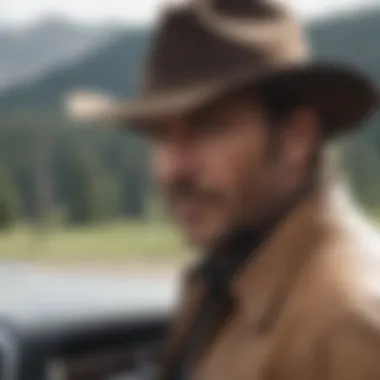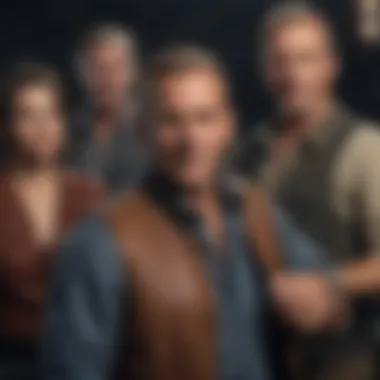Kevin Costner's Influence on Modern TV Series


Intro
Kevin Costner has become a household name, primarily known for his stunning performances on the big screen. However, his journey into the realm of television has left an indelible imprint on the medium itself. From profound characters to intricate narratives, Costner's foray into TV stands as a testament to his versatility and depth as a performer. This article explores how his contributions have not only defined specific series but have also influenced the overall landscape of television storytelling.
Costner’s popularity surged during the late 20th century in films like "Dances with Wolves" and "The Bodyguard." Yet, his pivot to television not only broadened his creative horizons but also enhanced the quality of programming. Shows that he headlined—most notably "Yellowstone"—have showcased his ability to merge personal and universal themes, appealing to a wide audience range. This exploration takes a closer look at crucial aspects like character development, thematic profundity, and even the evolution of his roles over time.
As we delve deeper into the impact of Kevin Costner on television series, we will analyze the unique challenges he faced, the noteworthy collaborations he undertook, and the cultural dialogues sparked through his performances. Costner's ability to resonate with viewers—whether through a heartfelt monologue or a gripping storyline—cements his legacy as a pivotal figure on television, shaping both genre and narrative form.
By dissecting these elements, we aim to illuminate the significance of his work beyond the accolades, unraveling how he’s mirrored and challenged societal norms through his characters. Thus, a thorough understanding of Costner's impact will not only reveal insights into specific series but also uncover broader trends within television itself.
Preface to Kevin Costner
Understanding the significance of Kevin Costner in the landscape of television requires a closer look at his multifaceted career. Costner is often celebrated for his contributions to film, but his ventures into television have not only enhanced his own repertoire but also enriched the medium itself. His ability to portray complex characters has resonated with audiences and influenced narrative styles. As we embark on this exploration, it’s essential to appreciate the nuances and depths of his work in various series, noting how they reflect larger societal themes and individual struggles.
Early Life and Career Beginnings
Kevin Michael Costner was born in Lynwood, California, in 1955. Growing up in a modest household, he balanced his interest in sports with his love for acting. After graduating, he pursued a degree in business at California State University, Fullerton. However, the allure of the stage proved too strong. His early career saw him taking on minor roles in various films and television shows.
His breakout came in the 1987 film "The Untouchables," where his portrayal of Eliot Ness marked a turning point in his career. Yet before he became a household name, he struggled backstage, often taking odd jobs to make ends meet. This period of uncertainty shaped his dedication and understanding of character roles, laying the groundwork for his later successes. The experiences from his formative years taught him resilience, and they directly influenced the types of complex characters he would later portray onscreen.
Transition from Film to Television
The leap from film to television is a journey not all actors can navigate smoothly, yet Costner has managed to do so with remarkable grace. Traditionally, television has been viewed as a lesser platform compared to cinema, but recent changes have shifted this perception. When Costner starred in "Hatfields & McCoys" in 2012, he not only revitalized interest in the miniseries format but also showcased the intricate storytelling possible on TV.
This transition was strategic; it allowed him to explore character nuances over a longer arc, something films often do not offer. With a growing demand for quality content in the television landscape, Costner's move to a series format showcased his versatility and commitment. His performances have often been layered, inviting viewers to see beyond mere archetypes.
Prominent Television Series Featuring Kevin Costner
Kevin Costner has made notable strides in the realm of television, leaving a mark that resonates with audiences and critics alike. His transition from film to small screen allowed him to explore more complex characters and narratives that television offers. This section will delve into the standout series where Costner has starred, illustrating his impact on the medium.
Yellowstone: A Modern Western Epic
Plot Overview
In Yellowstone, Costner portrays John Dutton, the patriarch of a powerful family who controls the largest contiguous ranch in the United States. The plot intricately weaves together themes of land ownership, family loyalty, and the American landscape's rugged beauty. What makes Yellowstone shine is its portrayal of contemporary issues through a Western lens. The series thrusts viewers into conflicts that resonate even today, like corporate greed and environmental concerns, making it a relevant and significant choice for this article. The blend of classic Western elements with modern dilemmas offers a unique viewing experience that keeps audiences coming back for more.
Character Dynamics
The character dynamics in Yellowstone are exceptionally rich, showcasing the intricate relationships within the Dutton family. John Dutton's interaction with his children reflects deep-seated familial tensions and the struggle to maintain their legacy. This complexity adds layers to the narrative, as viewers witness each character battling their inner demons alongside external threats. The show’s strength lies in its ability to portray these relationships authentically, striking a chord with audiences who appreciate multifaceted characters. The challenges Dutton faces with each of his children emphasize the show's theme of familial conflict, making it a compelling highlight in Costner's television journey.
Cinematic Techniques
Yellowstone employs stunning visuals and cinematic techniques that elevate it beyond typical television fare. The lush landscapes of Montana function as more than mere backdrop; they become a character in their own right. The use of sweeping shots captures the vastness of the Dutton ranch and reflects the isolation the characters often feel. Additionally, the show's pacing builds tension effectively, drawing viewers into its world with a blend of drama and action. This meticulous attention to detail not only showcases Costner in a commanding role but also enhances the overall storytelling, making the series a noteworthy example of modern television.
Hatfields & McCoys: The Miniseries
Historical Context
Set against the backdrop of one of America's most infamous feuds, Hatfields & McCoys presents a gripping account of the real-life conflict between two families. The historical context enriches the narrative, providing a fascinating glimpse into the fabric of 19th-century America. By framing the series within legitimate historical events, it adds layers of authenticity and weight. This approach is significant as it reflects the complexities of loyalty, vengeance, and the American identity, giving audiences a chance to reflect on their own historical narratives. It’s an invaluable addition to Costner's body of work in television, showcasing his capability to tackle serious themes.
Character Portrayals


Costner, portraying William "Devil Anse" Hatfield, embodies a character of considerable moral ambiguity. The portrayal is rugged and nuanced, infusing the role with emotion and depth. Character interactions emphasize the fraught nature of alliances formed in turmoil, showcasing the blurred line between right and wrong. This depth in character portrayals allows viewers to engage with the story on a personal level, as they navigate their feelings towards the feuding families. Costner’s ability to evoke sympathy while embodying a fierce patriarch makes this miniseries a compelling study in character development.
Critical Reception
Upon its release, Hatfields & McCoys garnered significant critical acclaim, underscoring the relevance of Costner’s work in elevating television miniseries. The nuanced performances, particularly Costner's, received accolades for their authenticity and depth. Critics praised the show for adeptly balancing the historical aspects with engaging drama, leading to high viewership ratings and positive reviews. The miniseries not only solidified Costner’s reputation as a television actor but also contributed to a resurgence in interest in historical narratives on the small screen.
The Last Cowboy: A Different Perspective
Setting and Themes
At the heart of The Last Cowboy lies a contemporary narrative set in the authentic backdrop of Montana’s ranching culture. The show navigates the intricacies of cowboy life, tackling themes of tradition versus progress. This exploration is vital as it highlights the challenges faced by ranchers amid changing societal norms and environmental concerns. The setting offers a familiarity with the cowboy mythos yet presents it through a modern lens, making it resonate with today's audiences. Costner’s involvement plays a crucial role in establishing this connection, further prompting reflections on cultural heritage in American society.
Cultural Significance
The Last Cowboy resonates deeply with themes of cultural identity and roots. Costner’s character embodies the spirit of ranching culture and showcases the tumultuous relationship between heritage and evolving societal values. This cultural significance is paramount in an age where traditional lifestyles face constant threats from urbanization and technology. Viewers find echoes of their own lives within its narrative, allowing for deeper connections to be drawn.
Audience Response
The audience response to The Last Cowboy has been noteworthy. Viewers often express appreciation for the authenticity and depth of the storylines and character arcs. Engaging with the trials and tribulations of contemporary cowboys, audiences have found a sense of belonging and recognition in the challenges portrayed. Despite some critiques regarding pacing, the reception overall depicts a strong engagement with its themes and characters, underscoring Costner’s adeptness at choosing projects that resonate deeply with viewers in a meaningful way.
Character Analysis in Kevin Costner's TV Roles
Kevin Costner’s roles in television series offer a fascinating glimpse into the complexity of the characters he brings to life. Understanding his character portrayals is crucial as it illuminates not only his acting range but also how these characters resonate with audiences. Through nuanced performances, Costner infuses his characters with depth, fragility, and moral dilemmas, making them memorable and relatable. The examination of these characters can provide insights into broader societal themes, drawing connections between the narrative arcs and contemporary issues.
Complexity and Depth of Characters
Costner’s approach to character development often reflects significant layers of complexity. Take, for instance, his role as John Dutton in Yellowstone. Dutton is not a simply defined protagonist; he embodies a range of conflicting attributes. He is fiercely protective of his family yet often isolated due to the weight of his decisions. This duality makes him a compelling character. His moral struggles shed light on larger themes of loyalty, sacrifice, and the desire to control one's destiny, engaging viewers in a deeper narrative.
In Hatfields & McCoys, Costner portrays William Hatfield, a man entwined in feuds and vendettas. His character’s development emphasizes themes of heritage and familial ties. The internal conflict and external pressures faced by Hatfield resonate with viewers, prompting them to reflect on the impact of historical grudges and the human cost of violence. This role encapsulates the intricate interplay between personal desire and social obligation, showcasing Costner's unique ability to create characters that are both relatable and richly complex.
Key Characteristics of Costner’s Characters:
- Multidimensional: Not easily categorized as heroes or villains.
- Relatable Motivations: Actions driven by family, loyalty, and honor.
- Dynamic Growth: Characters often evolve in response to their choices and circumstances.
Leadership and Moral Ambiguity
Leadership is a recurring theme in Costner's television roles, often examined through the lens of moral ambiguity. Characters like John Dutton wield significant power, yet their decisions frequently lead to ethical quandaries. The viewers are left questioning what makes a leader truly just—power, charisma, or a moral compass?
In The Last Cowboy, Costner’s character navigates the complex world of ranching in a rapidly changing society. This position requires making tough decisions that often have no clear right or wrong. Here, Costner's portrayal delves into what it means to lead in times of turmoil, forcing audiences to confront their own beliefs about authority and accountability.
“Costner’s characters force us to consider not only the actions they take but the motivations behind those actions.”
Costner’s ability to embody the role of a leader dealing with moral uncertainty resonates on multiple levels. It speaks to the human experience of grappling with decisions that can have far-reaching consequences. As viewers, we’re invited to engage critically with these characters, reflecting on the implications of their choices in our lives.
In Summary
The character analysis in Kevin Costner’s television roles reveals a tapestry of complexity, leadership dilemmas, and moral uncertainties. Each character he portrays embodies distinctive qualities that invite further examination of significant societal issues. His nuanced performances not only keep viewers engaged but also encourage them to dig deeper into the human experience reflected on screen. Through this analysis, it becomes clear how vital Costner’s contributions are to modern television storytelling.
Themes in Costner's Television Work
Exploring Kevin Costner's contribution to television, one can't help but notice the rich tapestry of themes that run through his work. These themes not only provide depth to the narratives but also resonate with audiences on a personal level. From family conflicts to cultural explorations, Costner’s television performances have been far more than mere entertainment; they are reflections of society, struggles, and the human condition. Understanding these elements aids in recognizing how his roles impact viewers and what cultural dialogues they inspire.


Family Dynamics and Conflicts
Family is often presented as a double-edged sword in Costner’s television roles. The dynamics can be fraught with tension or overflowing with love. For instance, in Yellowstone, the Dutton family operates against a backdrop of constant conflict—torn between loyalty to blood and the harsh realities of land and legacy.
"In this world, family loyalty can mean everything, but it may also cost one dearly."
The friction between Costner’s character, John Dutton, and his children encapsulates the struggles many face in maintaining familial bonds amidst competing interests. These narratives not only highlight complex relationships but also question what it means to be part of a family. Conflicts arise from differing values, jealousy, and ambition, painting a realistic picture that many can relate to in their own lives.
Cultural Identity and Heritage
Costner's television work also navigates themes of cultural identity and how heritage shapes individuals. In Hatfields & McCoys, for example, the stark contrasts between the two feuding families reveal much about American culture—what it means to claim land, honor family names, and uphold personal myths.
In situations where local customs clash with modern values, Costner's characters often serve as bridges, grappling with their heritage while trying to adapt to contemporary life. This reflects a deeper conversation about the preservation of culture in a rapidly changing world. The narratives invite the audience to ponder their own backgrounds, prompting an introspection on how culture affects individual choices and community relations.
The American Frontier Experience
The frontier experience is a hallmark theme in Costner's works, particularly evident in Yellowstone and The Last Cowboy. Such series encapsulate the struggle for survival, the dream of owning land, and the pursuit of freedom.
Costner’s characters frequently represent the quintessential American spirit—tenacity, independence, and a deep connection to the land. These portrayals stir emotions tied to nostalgia and aspiration. They beckon viewers to confront the rugged landscape of the American West, a metaphor for personal challenges and the relentless quest for identity.
By weaving the frontier motif into his roles, Costner compels audiences to examine their own lives against these timeless narratives, questioning the sacrifices made in pursuit of dreams and the legacy one wishes to leave behind.
In summary, the themes prevalent in Kevin Costner’s television work reveal layers of human experience and cultural reflection. Each story, bolstered by rich character dynamics and sociocultural discourse, invites viewers to engage more profoundly with the narratives on screen, making them enduring pieces of art in the television landscape.
Kevin Costner's Production Influence
Kevin Costner's foray into television wasn't just about acting; it was also marked by his significant influence behind the scenes as a producer. His role as a producer has brought a great deal of depth and uniqueness to the productions he is involved with, ultimately shaping the narrative landscape of modern television. Understanding this aspect of his career sheds light on how his vision transcends mere performance, extending to the very fabric of storytelling on screen.
Role as a Producer
Costner's production ventures are a testament to his commitment to storytelling. He took on the role of producer for key projects, most notably Hatfields & McCoys and Yellowstone. In Yellowstone, for instance, his vision was crucial in crafting a series that intertwines contemporary issues with timeless themes of land, family, and power dynamics.
When Costner steps into the producer's shoes, he brings a keen sense of authenticity. He seeks to ensure that the narratives are grounded in a nuanced portrayal of characters and their interactions with settings. This commitment helps to maintain a certain rawness and realism that keeps viewers engaged.
Moreover, he creates a collaborative environment where creativity can flourish. He has often presented directors and writers with the freedom to explore various interpretations of the material, leading to richer storytelling and often surprising directions in character arcs.
Collaborations with Writers and Directors
Teamwork is a cornerstone of television production, and Costner's collaborations with writers and directors exemplify this. Notably, he worked with acclaimed writer Taylor Sheridan in Yellowstone, where their partnership led to compelling storylines that resonate with a wide audience.
The synergy between Costner and Sheridan allowed for a fusion of ideas that enriched the series. They managed to create a tapestry of narratives that reflect the complexities of modern American life, especially in the context of familial ties and economic struggles. Ironically, it’s often the cultural dissonance in the stories they tell that captivates the viewers, bringing effective tension that propels the series forward.
Another noteworthy collaboration came with director Kevin Reynolds, particularly in Hatfields & McCoys, where their mutual understanding of the historical context and dramatic stakes resulted in a gripping narrative. This collaboration demonstrated how combined efforts in production can yield not just a show, but a cultural phenomenon, as the miniseries sparked discussions around historical accuracy and representation in media.
Costner’s influence as a producer is a reminder that in the world of storytelling, collaboration often leads to the most compelling results.
This blend of acting and production illustrates the multifaceted career of Kevin Costner on television and showcases how his contributions have left a lasting imprint.
Audience Reception and Cultural Impact
Kevin Costner's transition from a celebrated film actor to a significant figure in television has undeniably influenced the medium, mirroring shifts in viewer preferences and industry dynamics. The way audiences engage with his works offers insights not only into Costner's choices but also into broader cultural resonances that his characters evoke. In this section, we’ll dissect the viewership trends and ratings that have defined Costner’s impact on television, alongside an examination of the critical acclaim and awards that have recognized his contributions.


Viewership Trends and Ratings
Costner's television endeavors often reflect the ebb and flow of audience interests, particularly his flagship series like Yellowstone. With its gripping narrative and rich character arcs, the show has rapidly gained a dedicated following. Viewership ratings exemplify this. According to records, Yellowstone became one of the most-watched cable dramas in recent years, pulling in over 10 million viewers for its season premieres. This surge in viewership signals a hunger for storytelling that blends traditional western elements with contemporary issues—a longing for narratives rooted in both nostalgia and relevance.
The engagement statistics reveal how Costner’s performances resonate socio-culturally. His portrayal of John Dutton reflects the quintessential battle over land and legacy, appealing to viewers who appreciate intense family dynamics and moral complexity. Implementing digital analytics, networks have monitored audience demographics, noting that Yellowstone has predominantly attracted a viewership skewing toward middle-aged adults. The success there has made it a cornerstone for networks like Paramount Network, bringing about discussions about the evolution of Western storytelling in today’s landscape.
Critical Acclaim and Awards
When it comes to accolades, Costner's work on television has not gone unnoticed. His role in Hatfields & McCoys won him an Emmy Award and garnered significant praise from critics for its historical accuracy and emotional depth. Additionally, the performances across his mini-series have sparked conversations about the intricacies of character portrayals in limited series, driving home how Costner elevates material that might otherwise languish in mediocrity.
"Costner’s ability to portray flawed yet compelling characters transcends genres and speaks to the core of storytelling. The awards he has gathered are just the cherry on top of a sundae that is rich with narrative depth."
Besides individual awards, the series he stars in have collectively picked up several nominations and prestigious honors, impacting television cultural standards. As a result, Costner not only transformed his career but also shaped the quality and expectations of televised storytelling.
Future Directions in Kevin Costner's Career
As the landscape of television continues to evolve, Kevin Costner stands at an intriguing crossroads in his career. His past roles have not only carved out a niche for him in the industry but also set a precedent for future storytelling in television. The significance of this topic lies in exploring how Costner's experiences and choices might shape the next wave of television content. His gravitas and audience connection play crucial roles in any production, creating a wave of anticipation among fans and industry insiders alike.
In the current era, the shift towards streaming platforms provides Costner a multitude of pathways. With stories that resonate on a deep emotional level combined with his compelling performances, he has the potential to spearhead new projects that might redefine traditional storytelling. As viewers lean towards bolder narratives, Costner's participation could be pivotal in bringing forth ambitious themes that discuss the intricacies of society, culture, and personal conflicts.
Upcoming Projects and Anticipations
There’s always a buzz whenever Kevin Costner is set to appear in upcoming productions. Fans eagerly await announcements pertaining to new projects, and this anticipation is not unfounded. Costner’s name is often associated with quality and depth in storytelling.
- Film Sequel to Yellowstone: Speculations grow around a potential film that expands on the world established in Yellowstone, which focuses on the Dutton family's enduring legacy.
- New Series Proposals: There are whispers of upcoming series featuring Costner tackling characters from different walks of life. This could range from historical dramas to contemporary issues, showcasing his versatility.
- Documentary Projects: Given his passion for environmental conservation, projects highlighting nature or societal issues may appear, blending his artistic flair with a cause that matters deeply to him.
Costner's involvement will likely elevate the project's profile, drawing in an audience that appreciates depth over mere entertainment. His knack for engaging storytelling keeps viewers coming back for more.
Evolution of Television Roles
As television continues to carve out a distinct identity, Kevin Costner’s role within this evolution reflects both adaptation and innovation. His transition from blockbuster films to episodic storytelling is a testament to a broader trend in the entertainment industry. Traditional boundaries between film and television have blurred, allowing actors like Costner to explore a richer tapestry of character development.
Throughout his television career, Costner has portrayed an array of characters, each layered and complex.
- His roles have progressively shifted towards multi-dimensional characters, reflecting contemporary society's struggles, which were often simplified in earlier TV narratives.
- The shift puts a spotlight on moral ambiguity and personal conflict, both of which are central to many of his recent performances.
As the expectations of TV audiences become more sophisticated, Costner’s ability to evolve keeps him relevant. His further engagements in television may also serve as the launchpad for new storytelling innovations. Utilizing his established credibility, Costner could pave the way for daring narratives that reflect the challenges and aspirations of today's society.
"In the grand tapestry of television, Kevin Costner is not just a thread; he’s often a pattern-maker, helping to shape how stories unfold for a modern audience."
In summary, the future directions in Kevin Costner's career signify not just his personal journey but also the broader evolution of television as a medium. With his influence and foresight, the industry may see a shift towards richer narratives infused with depth and cultural awareness. As fans and critics alike keep a diligent eye on his next moves, one thing remains certain: there's much to be anticipated in the realm of television.
Finale
The conclusion of this article aims to encapsulate the significant trajectory of Kevin Costner's influence in television. His diverse roles, coupled with his unique storytelling approaches, have left a lasting mark on the medium. Costner has not just graced the television screen; he has infused depth into characters that resonate with audiences on various levels, illustrating the potential of the small screen to rival that of cinema.
The Lasting Legacy of Kevin Costner on Television
Kevin Costner's legacy in television is shaped by several key elements that showcase his multifaceted contributions.
- Diverse Roles: From the rugged landowner in Yellowstone to the intricate family dynamics explored in Hatfields & McCoys, his roles span a wide array of characterizations. Each role underscores the complexity of human experience, offering viewers rich narratives that provoke thought.
- Cultural Reflection: Costner's work often reflects societal values and issues relevant to contemporary audiences. His portrayal of characters grappling with moral dilemmas often mirrors the struggles of real-life individuals, making his performances relatable and impactful.
- Innovative Storytelling: The narratives Costner has brought to life on television convey themes ranging from family loyalty to the fight for land and identity. This storytelling has appealed to viewers' emotions and fostered deep connections with the stories told.
"Kevin Costner's characters aren't just fictional. They are mirrors reflecting the complexities of real life, making us question our own decisions and motivations."
In essence, his television legacy goes beyond mere acting; it's about building narratives that resonates with viewers emotionally and intellectually. Costner’s involvement as a producer has further enriched the television landscape, ensuring that projects he backs come with artistic integrity and a heartfelt connection.
As we reflect on Kevin Costner's impact, it's clear that his contributions have opened doors for future projects in television, encouraging deeper storytelling, ambitious character development, and a commitment to thematic richness. This legacy not only honors his work but also sets a standard for what compelling television should strive to achieve in the years to come.
In summary, Kevin Costner's journey through the landscape of television illustrates an exhaustive exploration of human experience through the lens of its complexities. As this art form continues to evolve, the influences of trailblazers like Costner will undoubtedly shape its future.







